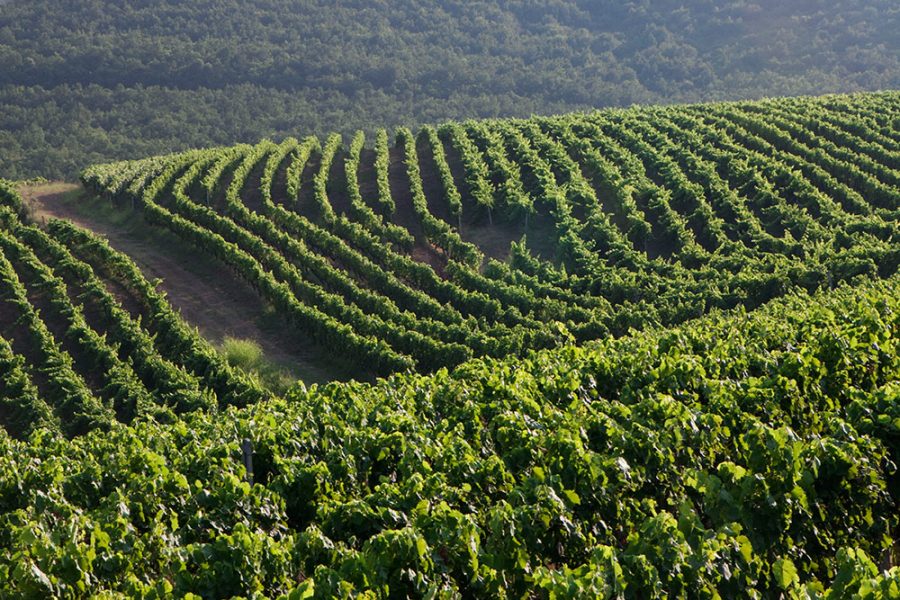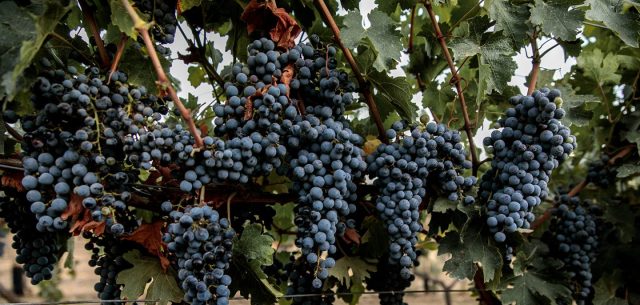The Wine Whisperer of Nemea

Hellenic history and art tells us that wine was a fundamental cultural pillar of Ancient Greece. But many fine varieties have been lost to the ages. Amanda Dardanis meets Kostas Bakasietas, the man who is raising extinct Greek varieties from the Dead.
Greeks, it is said, were the first to produce wine.
Certainly, we gave the world the marvelous epicurean concept of “symposium” – a convivial wine-fueled meeting of minds, as practised by Plato and his merry men back in the day.
In Greek Mythology, it was Zeus’ son Dionysus who bestowed the gift of wine by introducing the grapevine, and imparting to mortals the secrets of its cultivation and fermentation. Across this sun-drenched land, more than 300 indigenous grape varieties emerged. And while we may bemoan their competitive edge now, it was also Greece who first introduced wine-making to Italy, France and Spain – and as far away as parts of Asia.
But somewhere along the way, things got a little lost. To say the least.
Civil wars and world wars. Great famines and lengthy occupations. Phyloxerra outbreaks and economic catastrophe … They all contributed to an extended era where, when it came to Hellenic wines, Greeks became the champions of anti-marketing.
Pre-crisis, ninety percent of Greek wines were sold domestically. What modest export activity there was, remained self-restricting and myopic: mostly Greeks transporting Greek wines to other Greek communities abroad. Outside of those diaspora communities, it was the least auspicious Greek wines that attracted the most attention. Retsina anyone?
But every crisis, a silver lining. As domestic wine consumption here collapsed, Greek wine exports have flourished. The conversation around tables now – everywhere from Manhattan to Milan and Melbourne – has shifted. Put simply, Greek wines have become hot.
From the miasma of economic misery, a generation of modernist wine producers has sprung forth. Viniculturalists who are determined to change the perception of Greek wines on the world stage (and dethrone the Chardonnay-and-Cabernet-only mindset while they’re at it).
Enter global-minded visionaries like Kostas Bakasietas – an agronomist who is on a one-man crusade to resurrect endangered and extinct ancient wines across Greece, and take them to market.
Bakasietas, 35, trained in the wine-making arts in Montpelier and Bordeaux, and is the founder of the innovative Bakasietas Vine Nursery and Vineyards in Korinthos, Nemea – the first of its kind in Greece.
There could be few more symbolic locations for his bold venture than Homer’s “Vineyard of the Gods”. Nemea boasts 2,500 years of viniculture history and is internationally famous for its trademark Agiorgitiko variety, a red and hearty breed that has been cultivated since antiquity.
It’s also the place where Heracles concluded the first of his 12 Labors by slaying the Nemean Lion. The contemporary Labors of Kostas Baskietas would appear no less heroic.
Part wine archeologist, part vine healer, Bakasietas’ ambitious mission is three-fold.
Since 2004, he has worked tirelessly to gather certified material from all the big Greek varieties – such as the white Assyritico made from ancient vines on Santorini – in order to impose a more Gallic-style discipline previously lacking in the local industry.
‘Without certified material, you can’t travel, you can’t import. It’s how the French got ahead,’ says Bakasietas. ‘Now, we will open the doors for our Greek varieties to travel all over the world.’
From this certification process derives the second, also painfully time-consuming goal: sifting and analyzing the varieties for clones to yield better, more consistent results.
‘It’s a lot of work. You have to mark absolutely everything for when you come back later. The Greek inclination is to leave it up to “the next guy”,’ Bakasietas tells Insider. ‘But I decided to work the French way. You have to be patient, optimistic and passionate. ‘From the 216 different clones we have found for the Assyritico, for example, we are only going to give the market seven. ’
The first of the certified Assyritico will be available in 2016, according to Bakasietas, with countries as diverse as Brazil, America, Spain and Australia then starting to produce and label this Greek variety locally.
But it is the vine nursery’s third goal that has lay wine enthusiasts like myself, the most excited. The revival of Greece’s most endangered or extinct wines.
In some cases, it’s a matter of rescuing and cleaning compromised vines from environmental factors that have negatively impacted on colour intensity and aromas, as they’ve done with Agiogitiko and Moschofilero varieties.
‘From the first results we are seeing with the red Agiogitiko in Nemea, the wine is unbelievable. It’s vastly improved; much better colour and potential,’ enthuses Bakasietas. ‘With the blind tasting trials we have already done, there has been a real wow factor; people have been very impressed and excited.’
But in other instances, it’s literally bringing back wines from beyond the grave. Like the Asprouda of Santorini that Kostas was able to taste for the first time recently after locating just three dormant vines, back in 2005.
‘It was a big moment,’ he grins. ‘There was no wine in the market for this variety. But we found it. We rescued it.’
‘From finding the vine to actually making a wine off it, is a minimum of ten years. It’s a long haul.’
The Santorini Asprouda joins other resuscitated Greek varieties including the aromatic Malagousia, Crete’s Vilana, Lagorthi, the elegant dry white of Achaia, and the earthy vivid Limniona from Thessaly, in central Greece.
‘I’m sure we have lost a lot of varieties that we will discover again, little by little,’ Bakasietas predicts.
This vital work that Kostas and others in his field are undertaking heralds a lucrative new dawn for Greek viniculture – especially once more and more growers become engaged.
But beyond the commercial value and prestige of being able to debut excitingly rare varieties to the world, there is also a more poetic reward: The undeniable romance of reconnecting the broken thread that connects the wines drunk in the times of Alexander the Great and at Plato’s classic symposia, with the wines of today.
‘Greek wine producers are now working very hard and performing a lot of experiments that they didn’t do for the past 20 years,’ says Bakasietas. ‘Before, many were saying that it was impossible to make a commercial living from these rare varieties because their names were too hard for foreigners to pronounce. “How could someone from New York order an Assyritico in a restaurant?” they would say.’
‘But at the beginning, everything is difficult. You have to start somewhere. Now, we are all striving to educate the people outside of Greece.’
To book a private tasting tour at VINE NURSERY BAKASIETA or arrange a visit, phone +30 274.606.1245
The Best of Greece’s Reborn Wines (as recommended by Kostas Bakasietas)
Red:
- Xynomavro (5 years and older)
- Agiorgitiko (3 years and older)
- Limniona
- Mavrotragano
White:
- Assyritico (3 years and older)













